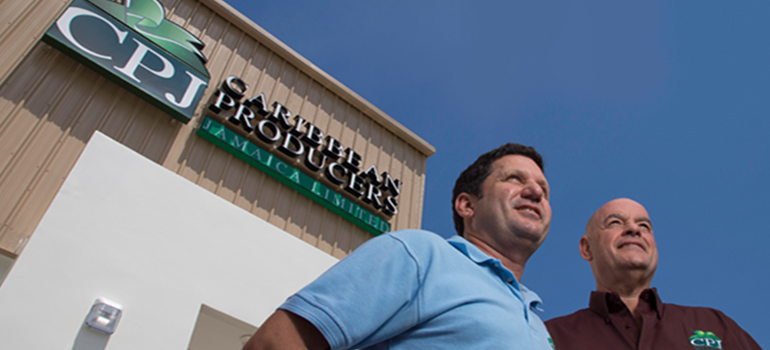Mark Hart – Chairman & Thomas Tyler – CEO, the founders of CPJ.
WHEN Caribbean Producers of Jamaica (CPJ) decided to offer to the general public 142 million shares in its company in 2011, the offer was opened at 9:00 am on July 8, 2011, and closed at 9:01 am on the same day — literally in a minute. The offer was scheduled to be closed on July 15, 2011, a week after the offer’s opening, but the bids placed by the investing public vastly outweighed the amount that CPJ had requested and, therefore, carrying the offer for a week would have been no more than an irrelevant exercise.
The plan
CPJ was founded by Western Jamaica businessmen Mark Hart and Thomas Tyler in 1994 to service the hospitality industry as well as the general retail market as a food service distributor. Before the successful offer was made in July 2011, a prospectus describing the company was sent out to potential investors. In this prospectus, a 91-page document filled with dates, charts, financial reports, and corporate profiles, was a small outline of the company’s expansion plans which didn’t take up more than a fifth of the page. It read:
“Expansion of the Company:
* Outfitting an additional dedicated agro and food processing plant at Montego Freeport
* Establishing a CPJ Market retail store in Kingston that caters to smaller commercial and retail customers
* Establishing a new distribution centre in St. Lucia, where several of the large hospitality and hotel customers of the Company are currently operating, subject to the Company’s satisfactory completion of its on-going due diligence exercise”
Mission accomplished
Between the years 2011 and 2014, the Jamaican economy has made a few business strategists, chief executive officers and board members a little greyer. The greying executive is an understandable phenomenon, given all that has transpired in this period: taxes have gone up, subsidies have been cut or made unlawful, fiscal constraints tightened, new laws added to the books, and natural disasters have wreaked havoc. Add this to the uncertainty of two deals with the International Monetary Fund (IMF) and this creates circumstances that would put significant strain on anyone trying to make plans for the future. The cost of the US dollar (USD) was also uncertain over this period. Between January 2011, and August 2014, the cost of the USD increased 31 percent or at an annual compound rate of seven per cent per year.
Therefore, it would not have been a total disaster had CPJ not been able to fulfil all its expansion objectives, considering the circumstances surrounding the economic climate, of course.
During Jamaica’s misadventures, CPJ was quietly going about its business and the three-pronged plan was under way. In 2012, the Company established a CPJ Market retail store in Kingston, while in 2013, it launched a new meat-processing plant at Montego Freeport in Montego Bay. Most recently, on February 4, 2014, it was announced that it had signed a shareholders’ agreement to form a joint venture with Du Boulay Bottling Company, the Coca-Cola manufacturer operating in Castries, St Lucia.
—
The Jamaica Observer



